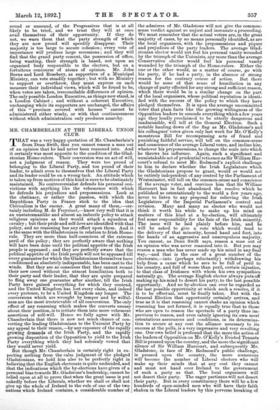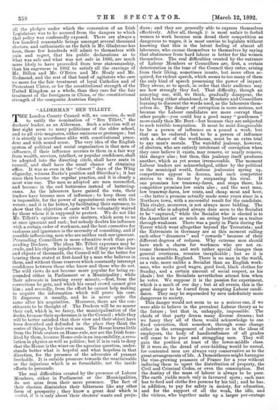MR. CHAMBERLAIN AT THE LIBERAL UNION CLUB. T HAT was a
very happy quotation of Mr. Chamberlain's from Dean Swift, that you cannot reason a man out of an opinion that he had never been reasoned into. And it certainly was most apposite to the condition of the Glad- stonian Home-rulers. Their conversion was an act of will, not a judgment of reason. They were too proud of belonging to the Liberal Party, and too proud of their leader, to admit even to themselves that the Liberal Party and its leader could be on a wrong tack. An attitude which is taken up from motives of this kind is sure to be obstinately maintained. No controversialist defends his personal con- victions with anything like the vehemence with which he defends his prejudices and prepossessions. Look at the obstinacy, or rather the passion, with which the Republican Party in France stick to the idea that Clericalism is the enemy. A great many of them,—cer- tainly including M. de Freycinet,—know very well that it is an unstatesmanlike and, almost an imbecile policy to attack religious opinions as they would attack a squadron of cavalry ; but their pride and self-love are identified with that policy, and no reasoning has any effect upon them. And it is the same with the Gladstonians in relation to Irish Home- rule. They are more than half-conscious of the extreme peril of the policy; they are perfectly aware that nothing will have been done until the political appetite of the Irish people is appeased ; and they are perfectly aware that the political appetite of the Irish people will not be appeased till every guarantee for which the Gladstonians themselves have conditioned as absolutely indispensable, has been cast to the winds. But they are so conscious that they cannot recant their new creed without the utmost humiliation both to their party and their leader, that they are quite prepared to fling away one guarantee after another, till the Irish Party have gained everything for which they contend, and the United Kingdom has lost every claim, and indeed every pretence, to be a United Kingdom any longer. The conversions which are wrought by temper and by wilful- ness are the most irretrievable of all conversions. The only effect of any reasoning which makes the converts uneasy about their position, is to irritate them into more vehement assertions of self-will. Hence we fully agree with Mr. Chamberlain that there is now not much chance of con- verting the leading Gladstonians to the Unionist Party by any appeal to their reason,—by any exposure of the rapidly growing demands of the Irish Party, and the rapidly growing disposition of the Opposition to yield to the Irish Party everything which they had solemnly vowed that they would never yield. But though Mr. Chamberlain is certainly right in ex- pecting nothing from the calm judgment of the pledged Gladstonians, we hold him also to be perfectly right in believing that the English electorate is quite undecided, and that the indications which the by-elections have given of a personal bias towards Mr. Gladstone's leadership, cannot be relied upon at all to prove that when the great issue is put nakedly before the Liberals, whether we shall or shall not give up the whole of Ireland to the rule of one of the two nations which Ireland contains, a considerable number of the admirers of Mr. Gladstone will not give the common- sense verdict against so unjust and insensate a proceeding. We must remember that the actual voters are, in the great majority of cases, by no means personally identified, as are the local organisers, with the prepossessions and piques and prejudices of the party leaders. The average Glad- stonian elector would not feel his personal vanity wounded by the triumph of the Unionists, any more than the average Conservative elector would feel his personal vanity wounded by the triumph of the Home-rulers. Either the one or the other would, as a matter of course, go with his party, if he had a party, in the absence of strong reason for the contrary course of action. But there would be none of that sense of humiliation in any change of party effected for any strong and sufficient reason, which there would be in a similar change on the part of the local organisers, whose political reputation is identi- fied with the success of the policy to which they have pledged themselves. It is upon the average uncommitted voter that plain facts like the growing willingness of the Opposition leaders to concede everything which a few years ago they loudly proclaimed to be utterly dangerous and inadmissible, will tell at the General Election. Such a notable hauling down of the flag as Mr. Gladstone's and his colleagues' votes given only last week for Mr. O'Kelly's monstrous Bill for recompensing acts of fraud and punishing faithful service, will tell on the common-sense and conscience of the average Liberal voter, and incline him, whatever his prepossessions, to change the scale into which he throws his influence. Again, such a significant and unmistakable act of prudential reticence as Sir William Har- court's refusal to meet Mr. Redmond's explicit challenge to him to declare whether the Irish Legislature which the Gladstonians propose to grant, would or would not be entirely independent of any control by the Parliament of Westminster, will tell on the common-sense and conscience of the a voter, and convince him that Sir William Harcourt has in fact abandoned the resolve which he published so ostentatiously to the world a few years ago, never to listen to any proposal for relieving the Irish Legislature of the Imperial Parliament's control and revision. Many and many an elector who would not think it worth his while to make up his mind on matters of this kind at a by-election, will ultimately feel some responsibility for the fate of the Irish minority. The issue will be laid plainly before him, and he will be asked to give a vote which would tend to the delivery of that minority, bound hand and foot, into the hands of an aggressive and unscrupulous majority. You cannot, as Dean Swift says, reason a man out of an opinion who was never reasoned into it. But you may reason a man who has never made up his mind in any final way,—and that is the case of a great number of the electorate,—into (perhaps reluctantly) withdrawing his help from a cause which he sees to be full of peril to his country, and full of worse than peril, certain injustice, to that class of Irishmen with whom his own sympathies naturally go. The average English elector always puts off making up his mind to desert his party, to the last possible opportunity. And no by-election can ever be regarded as the last possible opportunity at which such a resolve, if it is to be effectual, must be finally taken. But with the General Election that opportunity certainly arrives, and true as it is that reasoning cannot shake an opinion which reasoning has not formed, it is equally true that to those who are open to reason the spectacle of a party thus im- pervious to reason, and even calmly ignoring its own most ostentatious assurances and conditions, in its determina- tion to secure at any cost the alliance necessary to its success at the polls, is a very impressive and very revolting one. Our own belief is profound that the more the action of the leaders of Opposition on Mr. O'Kelly's Evicted Tenants Bill is pressed upon the country, and the more the significant silence of Sir William Harcourt, and subsequently Mr. Gladstone, in face of Mr. Redmond's public challenge, is pressed upon the country, the more numerous will become the number of Liberal electors who will make up their minds that at any cost they cannot and must not hand over Ireland to the government of such a party as that. The local organisers will not desert their party. The eager partisans will not desert their party. But in every constituency there will be a few hundreds of open-minded men who will have their faith shaken in the Liberal leaders by this perverse breaking of all the pledges under which the concession of an Irish Legislature was to be secured from the dangers to which that policy was confessedly exposed. There are always a few hundred reasonable beings amongst several thousand electors, and enthusiastic as the faith in Mr. Gladstone has been, these few hundreds will admit to themselves with pain and regret, that his public declarations as to what was safe and what was not safe in 1886, are much more likely to have proceeded from true statesmanship, than his eagerness in 1892 to satisfy all the cravings of Mr. Dillon and Mr. O'Brien and Mr. Healy and Mr. Redmond, and the rest of that band of agitators who care no more for the fair treatment of loyal Catholics and of Protestant Ulster, or for the constitutional strength of the United Kingdom as a whole, than they care for the fair treatment of the foreigners in China, or the constitutional strength of the composite Austrian Empire.



































 Previous page
Previous page